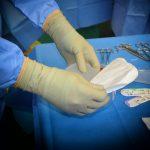Colorectal Surgery for Colon Cancer

Research has shown that early treatment can greatly improve treatment outcomes and survival rates for colon cancer and colon disease. Yet, many Americans suffer from these diseases and never get treatment because they either don’t understand its symptoms, or because they are embarrassed to see a doctor. That’s why it’s important to find a specialist who is experienced and knows how to deal with personal and sensitive matters such as this. The Colorectal Surgery team at Benrus Surgery Center St. Charles has been providing the community with excellent health care for over 50 years and continues to stay on the forefront of treating cancer and other diseases of the rectum, colon, and anus.
Cancer is always a word that sticks out and catches people’s attention. Although colon cancer has the second highest mortality rate in the United States, it can be treated. In the case of colorectal cancer, there are several symptoms that you should look out for. These conditions include:

- Your bowel habits change, such as constipation and diarrhea, for more than a few days.
- Rectal bleeding
- Feeling weak and fatigued
- Pain or cramping in the abdominal
- Blood in stool
- Sudden weight loss
Unfortunately, the appearance of these symptoms due to colon cancer is usually a sign that has spread and grown. Regular screenings can find the disease early and start treatment for a better outcome. Symptoms for colon cancer and other colon diseases are often similar however, that’s why you always seek the medical advice of specialist.
Colorectal cancer is highly treatable and can often be cured when detected early. The main form of treatment is Colectomy, a surgical procedure performed by a skilled Colorectal Surgery team. The operation consists of removing part or all of your colon. This operation also helps with other diseases that affect the colon, including bowel obstruction, excessive bleeding from the colon, ulcerative colitis, Crohn’s disease, and diverticulitis. Colectomy is also an option for preventative measures in people that have precancerous colon polyps and inherited genetic conditions. Colon cancer isn’t the only reason you may need to see a colon or rectal surgeon.

With so many highly-effective treatments for rectum and colon disease today, there is no reason why you shouldn’t be living the life you want. Early and regular visits will help you keep on top of your health and help improve your chances for a longer, happier life!
